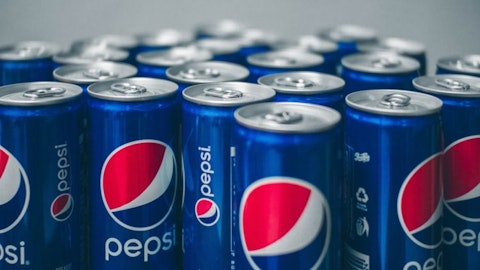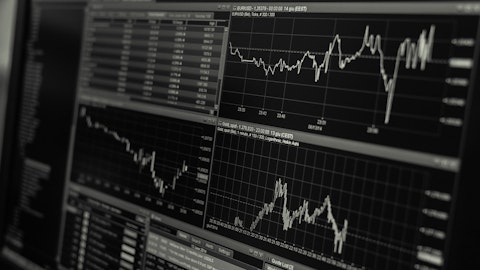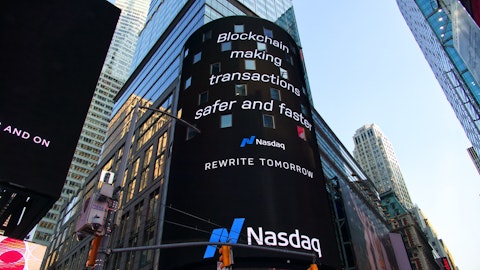We came across a bullish thesis on PepsiCo, Inc. (PEP) on Substack by Daan Rijnberk. In this article, we will summarize the bulls’ thesis on PEP. PepsiCo, Inc. (PEP)’s share was trading at $146.54 as of Jan 16th. PEP’s trailing and forward P/E were 21.61 and 16.92 respectively according to Yahoo Finance.

ja-san-miguel-xYSp0kkIUio-unsplash
PepsiCo’s share price has faced substantial pressure throughout 2024 as investors shifted their focus toward higher-growth stocks, compounded by external risks such as deglobalization and concerns surrounding the adoption of GLP-1 drugs. These factors have contributed to a 25% decline from its mid-2023 peak, with shares now trading at their lowest levels since mid-2021, despite revenue being over 15% higher. This sell-off has driven PepsiCo’s valuation multiples to its lowest since the early 2020 COVID-19 market downturn, presenting what appears to be an overly pessimistic market sentiment and a compelling entry point for investors.
PepsiCo, a global leader in the food and beverage industry, boasts a diverse portfolio of iconic brands such as Pepsi, Mountain Dew, Gatorade, Lay’s, Doritos, and Quaker. Its strategic focus on consistent price increases, global expansion, and acquisitions has enabled steady top-line and bottom-line growth, despite its reputation as a defensive, slower-growth stock. This resilience, coupled with its inflation-resistant nature, makes PepsiCo a reliable investment during economic downturns.
Analysts project continued low single-digit revenue growth and mid-to-high single-digit EPS growth through steady margin expansion. However, the company has grappled with rising input costs, resulting in higher prices and some volume declines. Additionally, the potential impact of GLP-1 drugs on consumer spending for snacks has emerged as a risk, albeit one that remains speculative and under-researched. While these factors warrant caution, the market’s response appears excessive, as PepsiCo’s current valuation—just 17x forward earnings, a 28% discount to its five-year average—fails to reflect the company’s enduring quality, reliability, and growth prospects.
At this price level, PepsiCo offers a robust opportunity for investors seeking stable, defensive growth. A discounted cash flow (DCF) analysis and valuation based on historical multiples suggest a conservative end-of-2026 price target of $184, translating to annual returns exceeding 11% (CAGR). Combined with a well-covered 3.75% dividend yield, the total potential annual return reaches 15%. This blend of income and growth makes PepsiCo a compelling choice for those prioritizing reliable performance amidst uncertain market conditions.
In summary, while risks tied to inflationary pressures and evolving consumer trends cannot be ignored, the current sell-off has created a rare opportunity to acquire PepsiCo at a significant discount. With its proven track record, stable growth, and attractive dividend yield, PepsiCo represents an excellent long-term investment with favorable risk-reward dynamics.
PepsiCo, Inc. (PEP) is not on our list of the 30 Most Popular Stocks Among Hedge Funds. As per our database, 58 hedge fund portfolios held PEP at the end of the third quarter which was 65 in the previous quarter. While we acknowledge the risk and potential of PEP as an investment, our conviction lies in the belief that some AI stocks hold greater promise for delivering higher returns, and doing so within a shorter timeframe. If you are looking for an AI stock that is more promising than PEP but that trades at less than 5 times its earnings, check out our report about the cheapest AI stock.
READ NEXT: 8 Best Wide Moat Stocks to Buy Now and 30 Most Important AI Stocks According to BlackRock.
Disclosure: None. This article was originally published at Insider Monkey.





